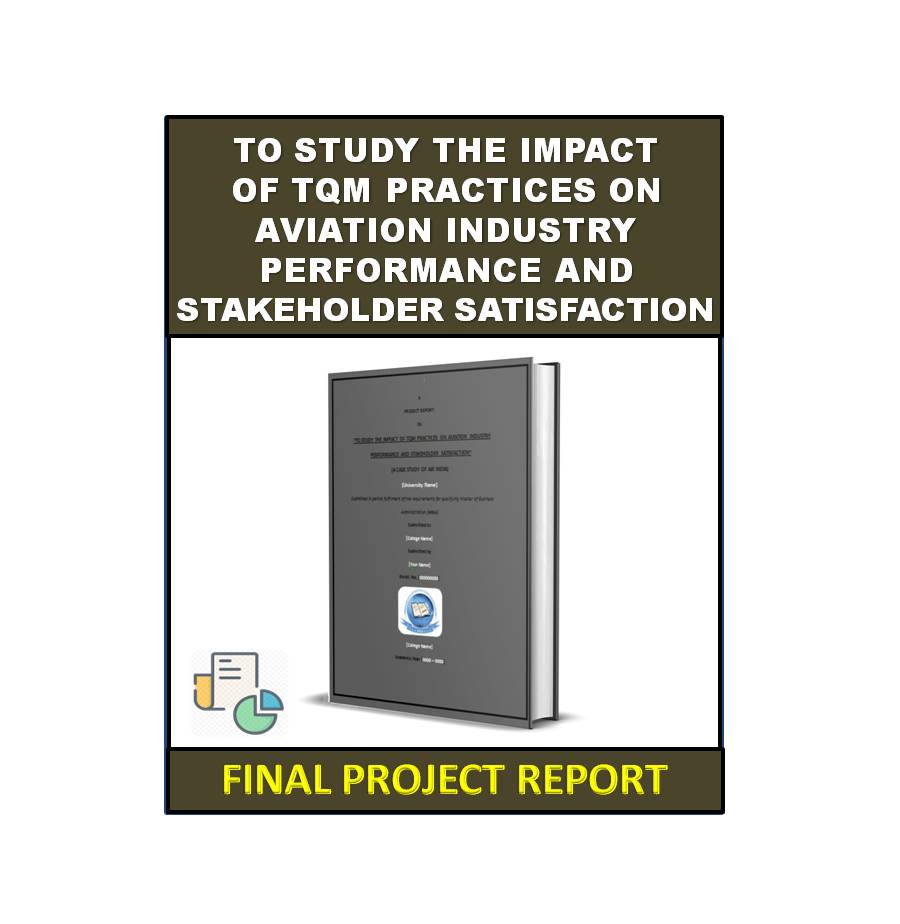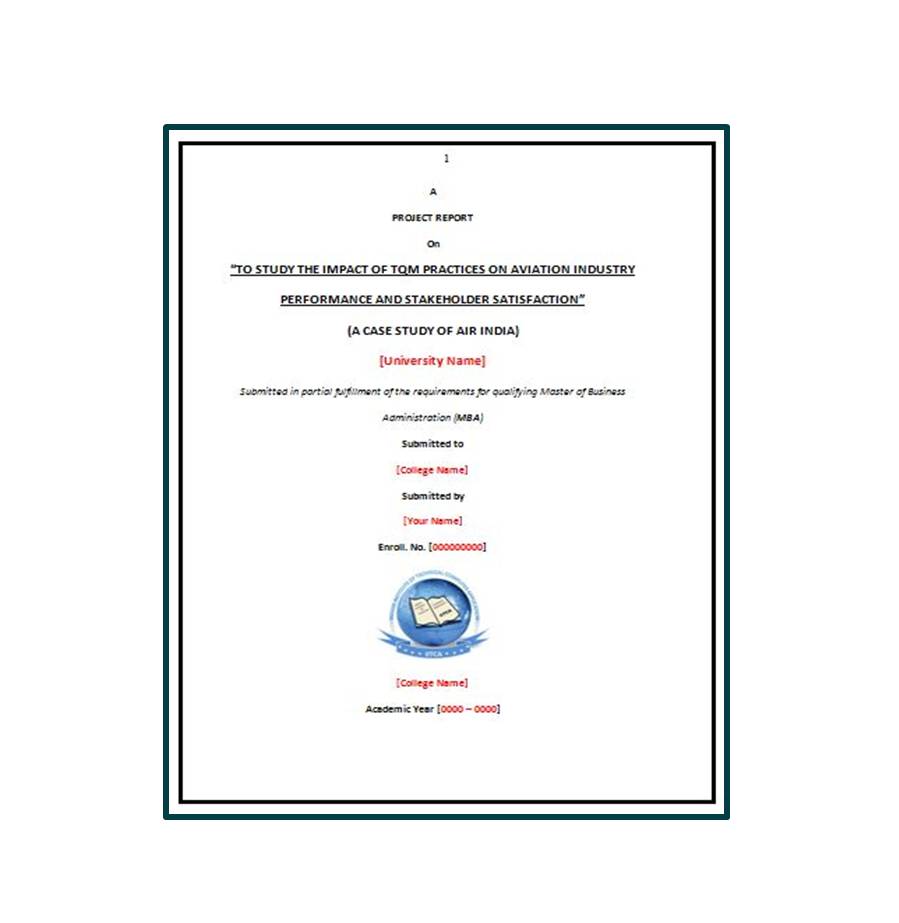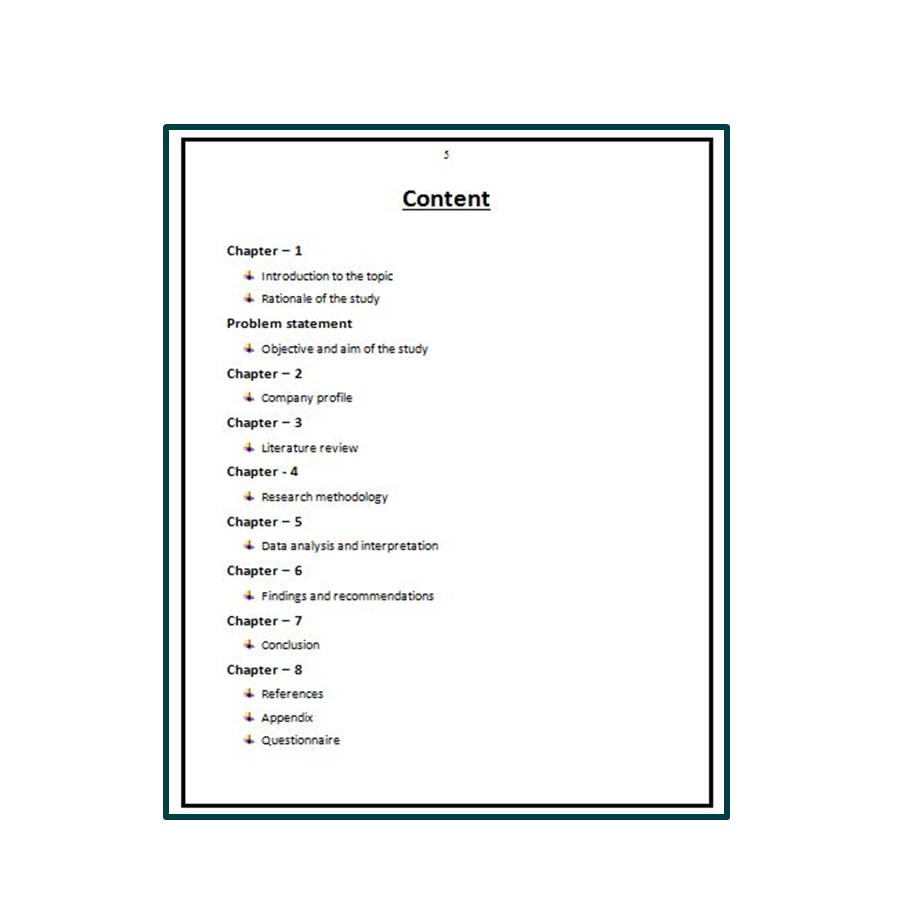Description
To Study the Impact of TQM Practices on Aviation Industry Performance and Stakeholder Satisfaction (Final Project Report)
| After purchase, For products with delivery between X to Y days only. | |
|---|---|
| Create a ticket | SUPPORT / TICKET |
Page Length : 70
EXECUTIVE SUMMARY
Total Quality Management (TQM) is a management philosophy which focuses on the work process and people, with the major concern for satisfying customers and improving the organizational performance. It involves the proper coordination of work processes which allows for continuous improvement in all business units with the aim of meeting or surpassing customer’s expectations. It emphasizes on totality of quality in all facets of an organization with the aim of reducing waste and rework to reduce cost and increase efficiency in production.
TQM is applicable to any organization irrespective of size, and motives, even the public sector organization are fast adopting the ideology in order to make them effective in meeting public demands. However, the adoption of the ideology by most organization has been hampered due to their non compliance with the procedures and principles of TQM implementation. While some organization, run TQM like a program which they expect to function and perform the magic all by itself, others have used a half hearted approach to it, by using some bits and pieces of the principles. This has accounted for the failure of most organization in meeting up to their expected target from implementing this ideology. There is a need to continue to buttress the benefits that accrue to organizations from the implementation of TQM, especially in developing economies, such as India where the adoption of these principles seems farfetched to organizations. The Indian Aviation industry gives us a true picture of the shortcomings of organizations in their quest to make profit at the expense of quality. With the spate of changes going on in the country due to government reforms, the nature of competition seem to be changing from what it used to be. The influx of foreign and local investors into different sectors of the economy has given rise to intense competition, thus the need for organizations to look internally into their operational procedures and change strategically to meet up with the challenges.
The problems of poor services have consistently characterized the Indian aviation industry, with the different stakeholders accusing one another for the inefficiency in service delivery. Even with new investors entering into the sector and adopting the TQM ideology, which have no doubt given the industry a face lift, there still persists an array of complaints by passengers making use of these services. This research aims to find out the quality level of Air India and the problems with the implementation of TQM and also will assess the effect of TQM implementation on the airline industry.
The deregulation of the airline industry in most part of the world marked the beginning of a new realm of competition in the industry. The deregulation ensured that airlines set fares and service levels based on the market situation. In trying to gain competitive advantage, airlines try to outshine their competitors by providing quality services that meets or exceeds the expectation of customers. Thus, customer satisfaction in the airline industry is never ending as they face numerous challenges and competition daily. This makes Quality management critical to the airlines as they strive to continuously improve their services to meet customers’ expectation.
Service quality is essential in the airline industry as it is a major determinant of competitiveness.
Airlines paying strict attention to service quality will be differentiated from others and will in the course of doing this gain competitive advantage. Although it’s been argued that price is a major determinant of airline choice by customers and most airline would rather compete on it than on service quality. However, not managing quality will mean no added and assuring value to the airlines.
The use of a strategic approach to quality management by airlines will therefore improve their competitiveness. This approach ensures that airlines remain customer focused. TQM enables innovativeness as it empowers employees to take decisions that affect their job. For the airlines to be innovative in it offerings, it requires a flexible structure which permits cooperation between different functions.
The implementation of TQM involves the buying in of different units involved in the process of service delivery into the ideology and practices of quality management, which should be championed by the leadership of the airlines. That is, the support and primary activities of service delivery must inculcate quality in their activities.
Content
Chapter – 1
-
-
- Introduction to the topic
- Rationale of the study
- Problem statement
- Objective and aim of the study
-
Chapter – 2
-
-
- Company profile
-
Chapter – 3
-
-
- Literature review
-
Chapter – 4
-
-
- Research methodology
-
Chapter – 5
-
-
- Data analysis and interpretation
-
Chapter – 6
-
-
- Findings and recommendations
-
Chapter – 7
-
-
- Conclusion
-
Chapter – 8
-
-
- References
- Appendix
- Questionnaire
-
| Services Offered |
| I only accept those projects that I can do 100% before the deadline.
Why you choose me? |








Reviews
There are no reviews yet